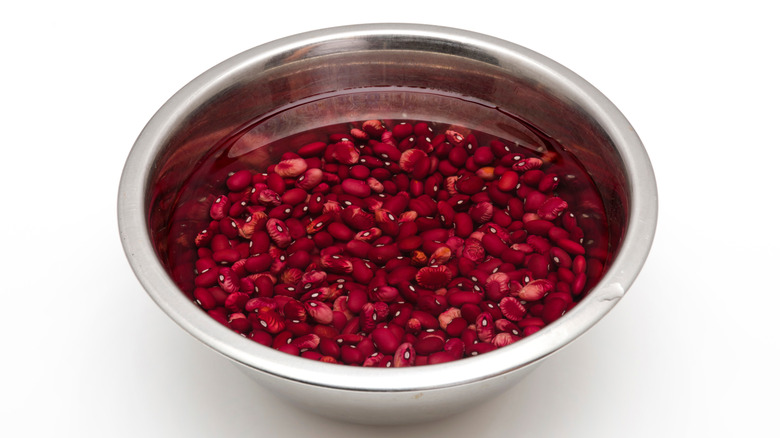The Best Type Of Beans To Choose For Traditional Red Beans And Rice
Red beans and rice is one of many bean dishes enjoyed around the world, originating from New Orleans, Louisiana. But don't be fooled by its name — this hearty dish is made up of more than just what its name implies. Typically the stew is made with beans, vegetables, meat (usually andouille sausage), and spices, all served over rice. Whether you ate this in a restaurant or your family's version at home, this smoky and warm dish is truly a comfort food. Red beans and rice recipes have variations in the beans, sausages, and vegetables used, and while each recipe might be equally delicious, some are more traditional than others. If you're aiming for a traditional style, stick to dried red kidney beans.
Though this dish can be made with other beans, red kidney beans are the OG for a traditional red beans and rice recipe. This isn't a surprise since kidney beans hold their shape when cooked and become perfectly soft rather than turning mushy. Using dried instead of canned beans will also give you the creamiest texture and maximum flavor. Soaking the beans overnight in salted water will give you the best results, as your beans will cook more evenly and be perfectly tender. It might seem like an annoying step, but it'll actually cut down your cooking time the next day, and also let's face it — hard beans aren't a price worth paying for.
How to get the most out of your beans
If you're questioning whether you actually have to soak your beans or simply don't have a night to spare, you can settle for a quick soak instead. This involves bringing your dried beans to a boil with water, then removing them from the heat and allowing them to soak between one and four hours. Once you've started cooking the beans for your red bean recipe, it'll take anywhere from one and a half to two and a half hours for your beans to become adequately softened. Since kidney beans are forgiving and don't get mushy, overcooking them a little isn't a big deal.
If you're after the bean's starch to make your hearty dish even creamier, 20 minutes of uncovered simmering should do the trick. If the water evaporates before your beans have released their creamy starches, feel free to add a little water until you reach the desired creaminess. Reheating and serving your red bean dish the next day will actually give your beans the creamiest texture and even richer flavor, but there's absolutely nothing wrong with digging in right away. With those warm and comforting smells lingering in your kitchen, it will be almost impossible not to.

